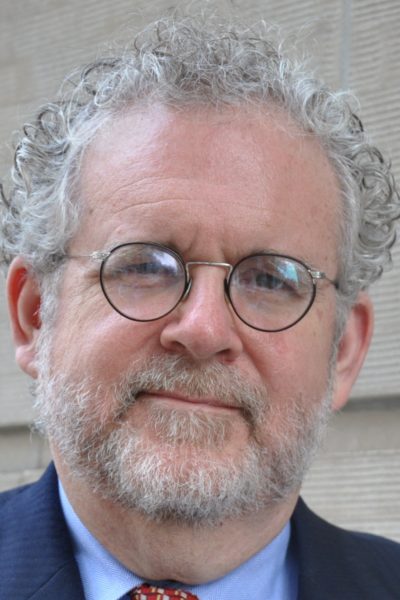This article about Christian foreign policy first appeared in Providence’s Winter 2019 issue of the print edition and is adapted from remarks given at Providence’s Christianity & National Security Conference, November 2, 2018. To read the original in a PDF format, click here.
People often ask, “What is meant by Christian foreign policy?” I often answer that question with another: “What’s the difference between Christian and non-Christian cherry pie?” Most people would agree that on the whole it is better to get cherry pie from a good but non-Christian baker than from the Sunday school teacher at the local church who has a wonderful heart but can never quite remember whether to use baking soda or baking powder when making a pie crust. So one good place to start from is that just because something is made in a church, or even made with love, does not mean it is fit for purpose. Christians need a critical approach toward things that call themselves Christian foreign policy—or people who identify themselves as Christians and claim some sort of special charisma in foreign policy. To claim that because my religion is good and my principles are sound, therefore my foreign policy must be good, is the hallmark of—let us not say an idiot, but of someone who needs to think a little more and try to “change the world” a little less.
Once people begin to think that there is something called “Christian foreign policy” that is different from and better than the non-Christian kind, it is only a short additional step to think that only Christians should make foreign policy. This, let me say clearly, is wrong. Is it a Christian position to say that Jews, Muslims, Hindus, and secular people should be excluded from positions of trust in our federal republic on the basis of their faith? Were the Founding Fathers wrong to prohibit religious tests in our Constitution? From the beginning, the American republic has embraced the idea that any citizen, regardless of, among other things, religious background or commitment, is free to participate at every level of public life. Baptism does not confer supernatural insight into tax policy, infrastructure policy, or foreign policy any more than it confers a special talent for baking cherry pie.
The United States has been blessed with many people who were only nominally Christian or were not Christians at all and accomplished great things in our foreign policy. We have also been cursed by our share of moralistic numbskulls who trumpeted their Christian credentials as they made one egregious blunder after another. It is my goal here to point Christians to ways in which the riches of their faith can inform their work in foreign policy, not to suggest that only Christians can or should lead our country. But if you don’t have to be a Christian to make good cherry pie, there are reasons to hope that attentive and dedicated Christians can become very good bakers. While Christianity may not be itself a surefire recipe for good cherry pie, within the treasures and the storehouses of the Christian faith are some remarkable ingredients that, if put thoughtfully and creatively together, can produce some very good foreign policy indeed. This, in my view, is why the field of foreign affairs needs more Christians and better Christians in it, and why the Christians who are active in this field need more wisdom and better access to some of the riches in the Christian faith. Diplomacy and Christianity have long gone hand in hand. From a historical perspective, the greatest diplomatic venture in the history of the world has been the progression of the Christian faith: ambassadors for Christ reaching out, beginning in Palestine two thousand years ago, and at this point having gone virtually through the whole world. While fire and the sword have, regrettably, been used in the spread of Christianity, on the whole it has spread more often and more effectively through persuasion. The missionary movement and movements of Christian evangelism require many of the tools that great diplomacy requires: an understanding of “the other,” an understanding of the world, an ability to reach across cultural and historical divides, the ability to find a common ground, and a deep engagement that continues to shape an ongoing relationship.
Not only has the spread of Christianity itself through the world been an outstanding example of diplomacy, it is also true that many of the best and most useful ideas and institutions in international life today proceed from the thought and the activity of Christians. The very idea of a global civil society—that humanity is a family and that there needs to be some sort of political expression of this unity—is something that Christian missionaries developed and try to embody. Some of the leading secular non-governmental organizations involved with human rights and other concerns around the world originated from missionaries at or near their founding. Ideas like international law come essentially out of the work of Christian theologians. Moreover, people who have tried to apply these concepts to international life, more often than not, have been inspired by their own Christian faith. The study of international relations history, history in general, and the origins and nature of diplomacy and international law reveals the absolutely central role that Christian faith has played in the development of these concepts. You don’t have to be a Christian to make good foreign policy, but past generations of Christians have left an impressive legacy in this field that Christians today should honor and, better still, study.
FIVE CONTRIBUTIONS OF CHRISTIANITY TO FOREIGN POLICY
Many clerics and theologians don’t like to hear this, but Christianity does not contribute much to the world of foreign policy by providing good moral advice to the practitioners. Everyone can recite moral rules; everyone can say that war is bad and justice is good. But leaders are generally not in need of obvious morality tales. Unless someone is a sociopath, they already both know and feel that war is bad while peace and justice are good; the assumption that such basic moral truths have not occurred to people who have dedicated their careers to guiding the affairs of the nation is as arrogant and condescending as it is ignorant and unfair.
The value of Christianity for foreign policymakers, thankfully, is not limited to moralistic sound bites. Christianity contains elements that allow statesmen to stay grounded in the maelstrom and make intellectual sense of what is out there in the world around them. Without that kind of support from the Christian faith, there will be fewer and fewer people who are really capable of living up to the tests of this time.
FAITH
First and foremost, faith in God and in his superintending Providence is as necessary to the political actor today as faith in God and his redeeming love is to each personal life. No person or human institution is capable of managing the forces that buffet society on its own. American political institutions are not infallible or perfect. Nor is the UN, the international system, or the framework of international law. The world is moving into a time of storms and change that these institutions and these people cannot manage on their own.
Although the scale of it may be new in the twenty-first century, every human society throughout history has faced problems it could not solve on its own, has been exposed to dangers that it could not manage alone. The locusts might come. The Goths or the Visigoths might come. The crops could fail. The plague could strike. The city across the hill could invade. Radical uncertainty about the future and the insufficiency of defense mechanisms to wall off all of the things to fear: that is the human condition. Yet people today are shocked to discover that, with all of the science and all of the institutions and all of the affluence in some ways they are still like a hill tribe in Judea watching the locusts darken the sky as they come over the horizon. This society too is facing problems that it does not understand, problems with no ready answer.
In order not to be overwhelmed by this vulnerability, in order to be able to both take the facts full on and see them as they are, not disguise them out of terror and denial, people must be standing on the rock of Abraham and must have faith in somebody bigger than them, stronger than them. For while God may not do what they want—he may not solve their problems at all, much less in the exact way they would like—he is there. He is in charge. People need that understanding to stand firm in the times we live in, and they will need it all the more in the future.
FREEDOM
Second, Christianity provides foreign policymakers with an invaluable gift if they will but receive it: the freedom from idolatry. Anybody who wants to play an effective role in the world today must be able to disentangle themselves from the shrouds of idolatry—the belief that something made by human hands can offer an absolute path of safety and security. Communism, capitalism, liberalism, communitarianism, feminism: there may be important truths embedded in these ideological programs and the political movements they inspire. But all of them were dreamed up by fallible people, and all of them fall short in some way.
This does not mean there are not useful things and useful suggestions in these ideologies, or suggest ignoring all of these ideas or all of these problems. But it does mean that no single one of them is a panacea. The agenda of the antinuclear movement is not going to provide safety from nuclear war. The various movements and fads that roil the culture and civil society from time to time, the development fads that jazz up the NGO world, will not in themselves solve the world’s problems. There is the belief that, if there were just a big enough movement behind some of these things, it would get to the answer. The world is not that simple.
It is very difficult for human beings to free themselves from idolatry, even when they know and worship the true God. Old Testament teaching underscores our struggle with idolatry. The people of God experienced miracle after miracle— yet there they were time and again worshipping idols. When people do not have the idea of a transcendent, just, good God, then the need to elevate something into that place is overwhelming. It’s an intellectual, cultural, and social need as much as anything else. And so human political agendas take that place: they make promises they cannot fulfill and stand in for the missing, absent God. It is easy to see more and more of that in American society, on the left as well as on the right.
Even good things produce evil when they’re set up and worshipped as gods. The worship of justice leads to cruelty and intolerance. The worship of peace leads to cowardice and acquiescence to injustice. The worship of freedom leads to license and anarchy. The worship of prosperity destroys the foundations of society, hollows out the human family and the human heart, and inaugurates the reign of greed. As idolaters, humans can neither think clearly about the world nor act wisely in it. They must know God in order to love and serve the truth.
ANTHROPOLOGY
Third, only Christianity can give an anthropology fit for purpose in today’s world. People are infinitely important and made in the image of God. This is an idea that any statesman, to be truly wise, can never lose sight of—that people are not just pawns to be moved around the chess board. They are real. They are people. They are ends in and of themselves. They bear the image of Almighty God.
At the same time, a statesman needs to know that he cannot trust them. The image of God is defaced. Human society is profoundly torqued and twisted by a presence of sin working itself out from generation to generation, building structures of injustice, structures of idealism. Some people talk about the ideal of a cosmopolitan post-national world; others say “the ideal is the nation, this loving community.” Those who know about original sin know that neither truly provides the answer—they are both flawed. Nations are communities of meaning; they are reservoirs of culture; they are wonderful things. But they also are prone to exaggerate their own claims and to oppress their neighbors. The same goes for most cosmopolitan, idealistic institutions which can also quickly gel into tyrannical or bureaucratic nightmares.
So, in order to think wisely about the world, statesmen need to know that people are important, people are deeply flawed, and there’s no getting out of that. This knowledge does not require being a Christian and having a doctrine of original sin, but it is a lot easier to acquire if personal experience reveals it and it becomes a habit of mind.
This knowledge helps statesmen think more clearly about practical plans. The US Constitution is an example of a document that is grounded in—steeped in—a concept of original sin. Implicit in its construction is the notion that neither the president, the Congress, nor the judiciary, neither the federal government nor the states are going to be wise, good, benevolent, and trustworthy. So what does the Constitution do? It sets up a system of checks and balances which leverages humanities’ greatest faults— our greed, our lust for power—to make the entire system better. That is how statesmen whose minds are grounded in the concept of original sin and in Christian anthropology can think constructively and realistically, and actually come up with solutions that work better than more idealistic ones.
COMMON HISTORY
Fourth, if Christianity continues to fade in American life, American society cannot carry the weight that smart foreign policy places on it. That is, if America continues to drift away from the values and the perceptions that shaped so much of its history, it is going to become a more divided, weaker, selfish, shortsighted place. It will sway from one extreme to the other and become less capable of supporting visionary politicians and policymakers. Its people will be more stirred by the passions of the moment, less capable of remaining free, and therefore become increasingly subject to various laws and bureaucratic restraints—the last gasp to keep order in a nation that’s moving away from the foundations of order and liberty. Christianity must remain in American life to have foreign policy that works.
America needs people who are able to make that connection. Above all, people whose lives and whose work are involved in building up the church, spreading the Christian faith, bringing the message of dignity and hope. In American life previously, there were moments when the country seemed to have lost touch with some of its essential dynamics. And in the past, God moved and sent revivals, sent renewal of Christian faith, raised up a different kind of spirit in a new generation that transformed the situation. Christians, whether working professionally in foreign policy or elsewhere, need to think and pray and work on that now, because without a strengthening of real, serious Christianity in American life, nothing that happens at the State Department or the Treasury Department or in the White House is going to do much good.
The world needs the United States. While it’s not the answer to every problem, America’s history of global vision, the structure of its interests, and the power that it has and can wield are essential to any kind of peace. If the United States were to lose the capacity to act and act wisely, the cost to people around the world, and here in the United States, would be catastrophic.
WISDOM
Each man and each woman needs the grace and help of God to be able to look the facts of this world in the face without fear, without being overwhelmed, without being tempted either to shortsighted optimism, shortsighted despair, or shortsighted denial. Americans, perhaps especially those in the world of foreign policy, need to become the kind of people who can act when the whole world seems to be falling apart, who can take thought—not simply to see something that strikes them as an injustice or a wrong and start running around squawking about petitions. They need to reflect, look at history, and take injustice and evil seriously enough to study them, put them in context, and think hard and wisely about what to do.
Citizens of a democratic republic are all, to some degree, sovereign. They participate in the sovereignty of their country as voters, as actors in civil society. And as such, they are not so far from the position of a man like Solomon, who, having been crowned king, looked around and said in 1 Kings 3:8-9, “Your servant is here among the people you have chosen, a great people, too numerous to count or number. So give your servant a discerning heart to govern your people and to distinguish between right and wrong. For who is able to govern this great people of yours?” My hope today—my prayer today—is that each Christian would think about that and make that prayer his or her own. Wisdom. Wisdom to play their role as Christians, wisdom to play their role as citizens, wisdom not just to pop off when they see an injustice, but the wisdom, the patience, and the courage to think, to study, to reflect, and to act.
Walter Russell Mead, a Providence contributing editor, is the Ravenel B. Curry III Distinguished Fellow in Strategy and Statesmanship at Hudson Institute, the Global View Columnist at The Wall Street Journal and the James Clarke Chace Professor of Foreign Affairs and Humanities at Bard College in New York. He has authored numerous books, including the widely-recognized Special Providence: American Foreign Policy and How It Changed the World. Mead’s next book is entitled The Arc of A Covenant: The United States, Israel, and the Fate of the Jewish People.







 Sponsor a student for Christianity & National Security 2024
Sponsor a student for Christianity & National Security 2024